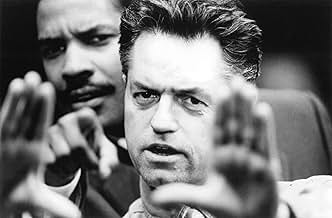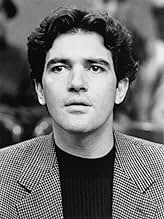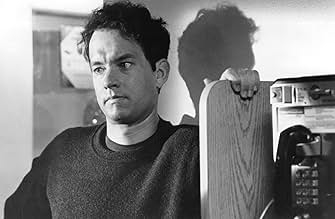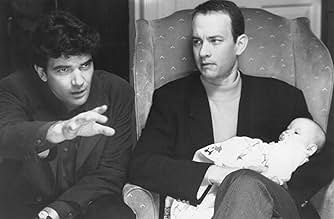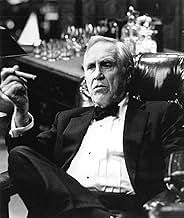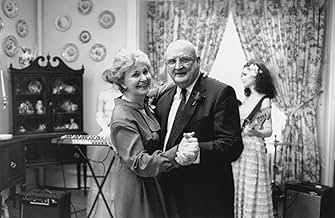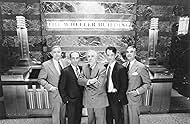Un hombre con SIDA es despedido del bufet de abogados donde trabaja a causa de su enfermedad. Para llevar su demanda por despido improcedente, contrata a un abogado homofóbico quien es el ún... Leer todoUn hombre con SIDA es despedido del bufet de abogados donde trabaja a causa de su enfermedad. Para llevar su demanda por despido improcedente, contrata a un abogado homofóbico quien es el único que acepta el caso.Un hombre con SIDA es despedido del bufet de abogados donde trabaja a causa de su enfermedad. Para llevar su demanda por despido improcedente, contrata a un abogado homofóbico quien es el único que acepta el caso.
- Ganó 2 premios Óscar
- 20 premios ganados y 23 nominaciones en total
- Rachel Smilow
- (as Stephanie Roth)
- Dirección
- Guionista
- Todo el elenco y el equipo
- Producción, taquilla y más en IMDbPro
Opiniones destacadas
AIDS is a reality and homophobia is a nasty truth that permeates our "United" States of America, as well as the rest of the world. At the time that this film was released (about 1993), the U.S. found solace in the idea that AIDS and homosexuality were dirty brothers in a distant family. By placing the film in the "City of Brotherly Love", hiring Bruce Springsteen to sing the title song and having an up-and-coming Tom Hanks star, director Jonathan Demme wisely readied an ignorant America for our first, uninhibited glance into the face of AIDS.
Tom Hanks embodied his role in an Oscar-worthy performance, allowing us to watch as his lovely and lively Andrew Beckett deteriorate before our eyes. Tom Hanks and the writers took to task the difficult and annoyingly controversial hurdle of playing the "gay" character and placing the "straight" audience into that different world. Stereotypes are mostly shied away from in the script with a few "fem" gays and drag queens. These scenes are few, but are also a reality. Many a Christmas party have I attended with the same crowd ("fems" and drag queens) in the mix. The other, mildly annoying, factor in this film is that the writers inform us that squeaky-clean gay Andrew Beckett contracts AIDS at a porn theater from an anonymous stranger, while in a committed relationship. This annoyed me because I wanted a righteous victim, not a impure victim. Yet as time has gone by and I have had the opportunity to work with many a victim of AIDS, whether be it male or female, gay or straight, I have seen that this too is an unfortunate reality. No one is perfect (gay or straight, male or female) and mistakes are often made. Costly mistakes are often made. This was a painful truth, but it is a truth nonetheless. In this, Tom Hanks as Mr. Beckett, brilliantly gave AIDS an honest face for a distant America.
Denzel Washington, on the other hand, allowed America to have a relatable character, one whose shoes we've fit in before. Denzel's views of homosexuality were (and still are) commonplace in the American psyche and his reactions to AIDS were understandable to the average audience. Yet all in all this dramatic film brought a message home.
Demme's directing style is nothing amazing; he tastefully weaves a tale without flashy shots or fancy cuts. At times the film borders on preachy, but, as always, it is Demme's story that grasps the audience, his mood that sets us into the tale, his actors and his direction of them that gives the film honesty. This film is highly recommended if not for the great acting but for lovers of a great story.
This movie is probably the best drama regarding gay issues ever made. Remember, it was made in 1993, when AIDS was still a terminal disease, and it recalls the early days of an epidemic that may not square with the vision afforded today, but at the time, this was the reality of AIDS.
The entire crew is A-List. Tak Fujimoto, who would also film Silence of the Lambs and Sixth Sense, directed cinematography. Jonathan Demme, also of Silence of the Lambs fame, directs with typical honesty and grit. Bruce Springsteen and Neil Young contributed hauntingly touching original songs. Even Antonio Banderas, whom I never miss an opportunity to vilify, is moving as Hanks' devoted and supportive partner. Denzel Washington was well cast as the homophobic lawyer who ultimately takes Hanks' case, and Mary Steenburgen is surprising in an uncharacteristic villain role.
Ron Vawter, who played one of the lawyers in the firm from which Hanks was fired, and also appeared in Silence of the Lambs, was himself suffering from AIDS at the time of filming, and he eventually succumbed to it a few years later. His appearance in the film encapsulates the reality of the AIDS epidemic, in that it often touched our lives in unexpected places.
Although I have literally thousands of movies in my collection, I don't own this one. Not because I don't love it. I do. It's because I can't watch it without being overcome by emotion. Anyone who can watch Hanks' in the Opera scene, or hear Springsteen's or Young's eerie and melancholy ballads and not weep is dead inside. But in the end, Philadelphia is about life, and making it matter.
¿Sabías que…?
- TriviaThe moment when Mary Steenburgen's character says that she hates the case was improvised in the moment, when the actress expressed her hate towards her role after shooting the mirror scene and Jonathan Demme encouraged her to incorporate it into the role, so the woman would seem more human.
- ErroresThe court stenographer doesn't seem to be actually typing, and the paper tape recording her keystrokes doesn't ever advance.
- Citas
Joe Miller: Have you ever felt discriminated against at Wyatt Wheeler?
Anthea Burton: Well, yes.
Joe Miller: In what way?
Anthea Burton: Well, Mr. Wheeler's secretary, Lydia, said that Mr. Wheeler had a problem with my earrings.
Joe Miller: Really?
Anthea Burton: Apparently Mr. Wheeler felt that they were too..."Ethnic" is the word she used. And she told me that he said that he would like it if I wore something a little less garish, a little smaller, and more "American."
Joe Miller: What'd you say?
Anthea Burton: I said my earrings are American. They're African-American.
- Créditos curiosos"This motion picture was inspired in part by Geoffrey Bowers' AIDS discrimination lawsuit, the courage and love of the Angius family and the struggles of the many others who, along with their loved ones, have experienced discrimination because of AIDS."
- Versiones alternativasThe cable and network television versions of Philadelphia edit out portions of the pharmacy scene where a gay University of Pennsylvania law student attempts to pick up Joe Miller. These two versions end this scene with the law student responding "Do I?" to Joe Miller's question concerning whether Miller looked gay. In the theatrical, home video and premium channel versions, Joe Miller continues to berate the law student with bigot remarks regarding homosexuals.
- ConexionesEdited into Die Geschichte des erotischen Films (2004)
- Bandas sonorasStreets Of Philadelphia
Produced by Bruce Springsteen and Chuck Plotkin
Written and Performed by Bruce Springsteen
Courtesy of Columbia Records
Selecciones populares
- How long is Philadelphia?Con tecnología de Alexa
- What is Philadelphia about?
- How does the movie end?
- Is this film based on a true story?
Detalles
- Fecha de lanzamiento
- País de origen
- Idioma
- También se conoce como
- Philadelphia
- Locaciones de filmación
- Productoras
- Ver más créditos de la compañía en IMDbPro
Taquilla
- Presupuesto
- USD 26,000,000 (estimado)
- Total en EE. UU. y Canadá
- USD 77,446,440
- Fin de semana de estreno en EE. UU. y Canadá
- USD 143,433
- 26 dic 1993
- Total a nivel mundial
- USD 206,678,440
- Tiempo de ejecución2 horas 5 minutos
- Color
- Mezcla de sonido
- Relación de aspecto
- 1.85 : 1
Contribuir a esta página







